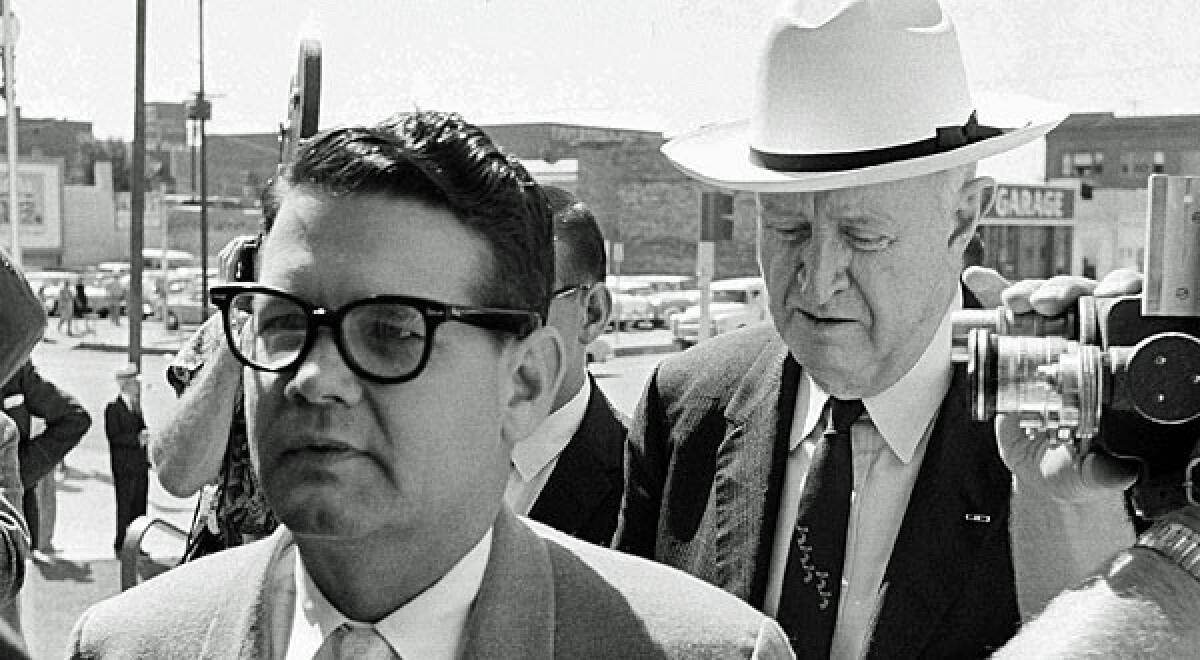Billie Sol Estes dies at 88; notorious Texas con man in 1960s scandal

- Share via
Billie Sol Estes, a flamboyant Texas huckster who became one of the most notorious men in America in 1962 when he was accused of looting a federal crop subsidy program, has died. He was 88.
Estes died in his sleep at his home in DeCordova Bend, a city about 60 miles southwest of Dallas, his daughter, Pamela, said Tuesday.
Estes’ name became synonymous with Texas-sized schemes, greed and corruption. He reigned in the state as the king of con men for nearly 50 years. Time magazine put him on its cover, calling him “a welfare-state Ponzi … a bundle of contradictions and paradoxes who makes Dr. Jekyll seem almost wholesome.”
PHOTOS: Notable deaths of 2013
“He considered dancing immoral, often delivered sermons as a Church of Christ lay preacher,” the magazine wrote. “But he ruthlessly ruined business competitors, practiced fraud and deceit on a massive scale, and even victimized Church of Christ schools that he was supposed to be helping as a fund-raiser or financial advisor.”
Estes was best known for the scandal that broke out during President Kennedy’s administration involving phony financial statements and non-existent fertilizer tanks. Several lower-level Agriculture Department officials resigned, and Estes spent several years in prison.
His name was often linked to fellow Texan Lyndon Johnson, but the late president’s associates said their relationship was never as close or as sinister as the wheeler-dealer implied.
Johnson, then the vice president, and Agriculture Secretary Orville Freeman came under fire during the scandal, though the scheme had its roots in the waning years of President Eisenhower’s administration, when Estes had edged into national politics from his West Texas power base in Pecos.
In 1965 Estes was convicted of mail fraud and conspiracy to defraud. He served six years in prison and was freed in 1971.
After new charges were brought against him in 1979, he was convicted of mail fraud and conspiracy to conceal assets from the Internal Revenue Service. He was freed a second time in 1983.
Former Associated Press correspondent Mike Cochran, who covered Estes’ trials and schemes throughout the 1970s and 1980s, recalled writing about how Estes made millions of dollars in phony fertilizer tanks — and noting, “How many city slickers from New York or Chicago can make a fortune selling phantom cow manure?”
“Billie Sol was a character’s character,” Cochran said.
Estes was a millionaire before he turned 30. Many of his deals involved agriculture products and services, including irrigation and the fertilizer products that later led to his downfall.
One of the stranger episodes involved the death of a Agriculture Department official who was investigating Estes just before he was accused in the fertilizer tank case.
The 1961 death of Henry Marshall was initially ruled a suicide even though he had five bullet wounds. But in 1984, Estes told a grand jury that Johnson had ordered the official killed to prevent him from exposing Estes’ fraudulent business dealings and ties with the vice president. The prosecutor who conducted the grand jury investigation said there was no corroboration of Estes’ allegations.
In 2003, Estes co-wrote a book published in France that linked Johnson to Kennedy’s assassination, an allegation rejected by prominent historians, Johnson aides and family members.
A 2007 search for correspondence between Johnson and Estes found only sporadic correspondence during Johnson’s Senate years, according to the Lyndon Baines Johnson Library and Museum in Austin.
PHOTOS: Notable deaths of 2013
While he admitted to being a swindler, Estes also portrayed himself as a “kind of Robin Hood” and hoped to be remembered for using his money to feed and educate the poor. He was an advocate of school integration in Texas long before it was fashionable.
Estes’ wife Patsy died in 2000. He later moved to Granbury, a town southwest of Fort Worth, and remarried.
At the height of his infamy, Estes was immortalized in songs by Allan Sherman (in “Schticks of One and Half a Dozen of the Other”) and the Chad Mitchell Trio (in “The Ides of Texas”).
More to Read
Start your day right
Sign up for Essential California for the L.A. Times biggest news, features and recommendations in your inbox six days a week.
You may occasionally receive promotional content from the Los Angeles Times.







